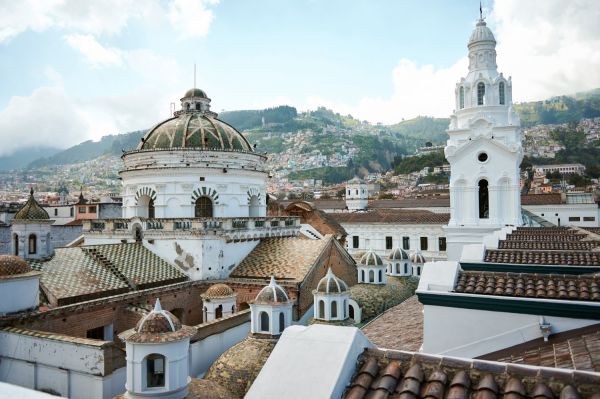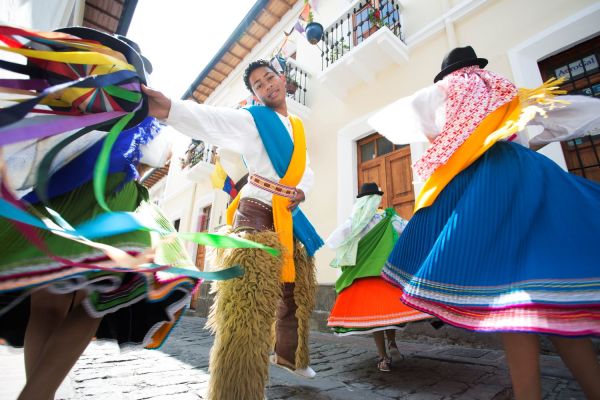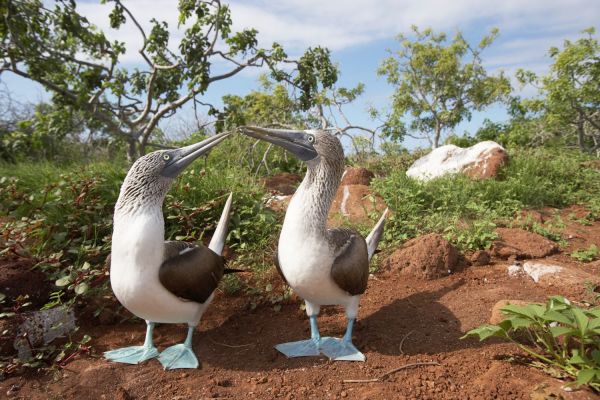QuitoTravel Guide
Quito, the capital of Ecuador, is one of the most picturesque cities in South America. It’s encircled by the Andes mountains and has the Pichincha volcano among its iconic landmarks. The heart of the city — Centro Histórico (Old Town) — reflects its Spanish and Indigenous influences through colonial architecture, carefully restored 16th- and 17th-century churches, plazas, museums and narrow cobblestone lanes leading to hidden art galleries and curanderas (traditional healers).
Outdoorsy travellers and nature lovers will love Quito’s beautiful green spaces and access to nearby hikes, cloud forest and unusual experiences. Ever set foot on the equator?
If nightlife is more what you’re after, the colourful capital offers many vibey bars and clubs to get your salsa on. Quito’s also known for street performances and festivals where you can immerse yourself in the local culture.
For many other interesting and enticing reasons to visit, read our Quito Travel Guide!
Quito quick facts
Language
National language
Spanish
Beverages
Bottle of Coke/Pepsi (330ml)
ZAR R22.52
Local time
Thursday
2:53am
Currency
United States dollar
ZAR R1.00 = USD $0.05
Eating out
Restaurant meal (casual dining)
ZAR R80.44
Electricity
Plug type: A
2 or 3 pins • 120V
Explore Quito
Where to stay in Quito?
Quito is divided into the Old Town (Centro Histórico), a UNESCO World Heritage Site, and New Town (La Mariscal). Your choice of where to stay depends on your preferences. If you enjoy being surrounded by colonial buildings, historical attractions and a combination of art, culture and tradition, the Old Town is ideal. On the other hand, if you prefer a contemporary area with an exciting nightlife scene and a younger crowd of locals and tourists, New Town is the place to be.
For affordable accommodation in the centre of the city, La Casona de la Ronda is an excellent choice. This historic, pastel-coloured boutique hotel in Quito is close to top attractions and the night-time hangouts of La Ronda. Special features include a hidden courtyard, handcrafted furniture and spacious rooms.
Travelling with the family? Then you’ll love Old Town Quito Suites and Boutique Hotel where you can get the best of both hotel and self-catering services. Situated in a heritage mansion in a quiet street, the hotel has only seven rooms, offering a private and “un-touristy” stay.
If you’re on a tight budget, consider staying at Masaya Quito. Housed in a charming colonial-style building, it has both private rooms and dorms and provides all the basics. It’s also conveniently situated near Quito’s main attractions, including Independence Square and the Presidential Palace, all within walking distance. Plus, Masaya Quito’s a fun place to meet fellow travellers over discounted mojitos!
Chakana Hotel Boutique Mariscal is an Andean-themed, 3-star bed and breakfast just over a kilometre from El Ejido Park. Offering mountain or courtyard views, a garden, rooms with a Jacuzzi and an on-site Ecuadorian restaurant, it also provides a cultural immersion — from the art and décor to on-site educational workshops.
Want to splurge on your stay? Then the five-star Swissôtel Quito is for you! Close to La Mariscal in the Floresta district, this unassuming high-rise building is all luxury inside! Think sleek décor with Ecuadorian touches, Egyptian cotton linen, a Turkish bath and spa, a piano bar and three restaurants! Need we go on? Thought not!
For budget accommodation, the Heritage Inn is basic but clean, cozy and centrally located. The staff are friendly, there’s free Wi-Fi and bike hire on-site, plus you'll get a big healthy breakfast to kickstart your day.
Believe us when we say, this is just the start. Book your accommodation today!
Things to do in Quito
From exploring the Old Town and enjoying breathtaking views from the sky tram to hiking and partying, Quito has something for everyone. Plus, the city’s a springboard to many other adventures!
The 16th-century Old Town is home to over 200 churches, convents and monasteries, many within walking distance of each other. A must-visit is the magnificent Basílica del Voto Nacional, a towering neogothic cathedral featuring stunning stained-glass windows. It was never completed because, according to legend, the world would end on completion! Join a walking tour to find out all about it.
Afterwards, stop by La Ronda, one of the oldest streets in Quito, dating back to the Incas. Today, it overflows with local markets, artisanal shops, bars and restaurants. Hang around until after sunset and mingle with artists, musicians and writers with a pint of cinnamon-infused canelazo in hand.
For a panoramic view of the city and mountains, hop aboard the iconic sky tram, the TelefériQo. As one of the world’s highest cable cars, a 2.5km ride will carry you up the side of the Pichincha volcano to the Cruz Loma lookout. If you’re fit and adventurous, you can also hike up to the summit.
Quito’s biggest and liveliest event, Fiestas de Quito, takes place annually to commemorate the official founding of Quito. It kicks off in late November and runs for a week. During this time, residents and visitors spill out onto the streets and squares to enjoy parades, open-topped party buses and live bands.
Quito is a gateway to many other attractions in Ecuador, such as the remote Galápagos Islands (a five-hour flight away) or the renowned cloud forest. The islands are a UNESCO World Heritage Site and a nature lover’s paradise, home to species found nowhere else on Earth — like the Galápagos tortoises. The landscape is dotted with volcanic formations and pristine beaches, and activities include hiking and scuba diving.
Set on the slopes of the Andes, the biodiverse jungle of the cloud forest is packed with plant and animal species and, as the name suggests, is often shrouded in mist caused by condensation. Activities to enjoy here are ziplining, birding and hiking. Only 90 minutes away from Quito by car, it’s ideal for a day tour. You can also book a tour with an experienced guide.
The Amazon rainforest is also just a short flight away. You can go jungle trekking with a guide to discover fascinating animals and birds, travel by boat down the Amazon River or enjoy a cultural immersion by visiting one of the Indigenous communities.
Quito’s La Carolina Park offers an escape from the city to gorgeous botanical gardens, manicured lawns and a lake — ideal settings for a picnic. Activities here include paddle boating, volleyball, cycling, a skatepark and a playground.
Stand on the equator where the two hemispheres meet at the Mitad del Mundo (Middle of the World) monument. This unique attraction offers many activities and experiences, including exhibits, a planetarium and a beer museum! It’s about an hour by public bus from the city or you can hop on a tour bus.
laza Foch is Quito’s entertainment hotspot. It's a square packed with clubs, restaurants and bars where you can party ’til dawn with fellow tourists and get to meet friendly locals. During the day, explore the cafés, museums, galleries and shops.
Enjoy dancing? Salsa is an integral part of Quito's nightlife scene, and many venues are dedicated to this form of dance. Whether you’re a beginner or a pro, everyone’s welcome on the dancefloor!
Looking for an immersive experience? Then a tour is the way to go.
Flights to Quito
Quito food and drink
With Spanish as the official language, Quito’s cuisine is steeped in Spanish influences, blended with Indigenous cuisine and a dash of African flavour. So, you’ll find dishes like empanadas (filled pastries), fritada (pork fried with sliced plantains and corn kernels), humita (savoury steamed corn cakes) and locro (a hearty traditional soup eaten for lunch every day).
While a variety of restaurants, food trucks and stalls are dotted throughout the city, some of the best eateries are found in Centro Histórico (Old Town).
For traditional Ecuadorian dishes, snap up a table at the charming Casa Los Geranious where the seco de chivo (braised goat stew) and patacones (plantain fritters) are highly recommended.
La Caponata is a highly rated Sicilian restaurant dishing up vegetarian food in the Casa Santa Bárbara cultural hub, while some ultra-fine dining can be had at the Casa Gangotena hotel restaurant. Set in a gorgeous, opulent mansion built in the 1920s, the restaurant serves a “sensory experience” with an experimental Cocina Mestiza menu that reimagines traditional Ecuadorian dishes.
Street food is an institution in Quito. Head out on foot and you’ll find streetside vendors and food trucks throughout the city selling locro, tortillas de tiesto (corn pancakes), llapingachos (potato patties filled with cheese), espumilla (meringue cream dessert served in a cone) and many other traditional favourites. Street food is available from breakfast to late at night and you’ll also come across healthy options like fresh cut fruit and juices.
De la Llama on Suiza Street is a colourful, quirky place offering a contemporary dining experience and an eclectic menu. Mains include pork belly, octopus, hoisin duck and lamb ravioli! They also have great cocktails and take their coffee seriously.
Quito has a thriving craft beer scene and the best way to get acquainted with the various brews is at one of the gastro pubs, like Viva Cerveza!. Set in an unmissable building painted hot pink (The Pink House) in La Carolina, the menu features nachos, wings, quesadillas and tacos set to a pumping soundtrack paired with Bandidos and Quitena beers.
Get a real taste for the local cuisine by booking a tour.
Quito through your eyes
Where to shop in Quito?
While Quito’s not quite a shopping mecca like Hong Kong or Bangkok, there are still some great retail experiences to enjoy and bargains to be found.
Situated near the Olympic stadium, Quicentro is Quito’s largest shopping centre. Yes, the prices can be a little steep, but in return you’ll find international fashion and footwear brands like Zara, Calvin Klein, Aldo and Steve Madden as well as top tech at the Samsung and Sony stores. You can also get acquainted with upmarket local brands and tuck into familiar fast food like Pizza Hut and KFC. For entertainment, there’s a cinema and bowling alley.
El Jardin Mall is another good option, situated between Amazonas Avenue and República Avenue. It houses more than 160 stores across four floors, a “Gourmet Zone” of six restaurants and the progressive feature of a sustainable food court. Food is dished up on ceramic plates and in polycarbonate glasses or ceramic cups and you are given stainless steel cutlery. After eating, you take your plate to a station where employees determine organic vs. inorganic waste and dispose of it accordingly!
If you’re not a fan of shopping malls, head to the La Mariscal Artisan Market. This covered market sells traditional items like beautiful embroidered shirts, ponchos and souvenirs. You can also find bags and jewellery, plus bargaining is recommended. The La Mariscal area of Quito is also known for its exciting nightlife — a great way to round off a day of shopping.
Fancy venturing beyond Quito in search of locally made items? Although it’s a two-hour drive away, the Otavalo Market is one of Ecuador’s largest and best-known Indigenous markets. You can take a public bus or taxi there and enjoy browsing through the labyrinth of stalls selling alpaca wool jumpers and blankets, leather goods and genuine Panama hats, crafted from toquilla palm leaves sourced along Ecuador’s coastline. Although most stalls are open during the week, the best day to visit is Saturday.
On weekends, Parque El Ejido transforms into an open-air gallery where local artists display their creations — from paintings and handwoven traditional clothing to jewellery and more. With many stalls to explore, you can spend hours discovering unique and creative items. Afterwards, find a quiet, shady spot to enjoy a relaxing picnic.
When in Quito, you just have to stock up on Ecuadorian coffee beans! The city has many specialty coffee shops and cafés but one of the most popular is Café Águila de Oro. Enjoy a delicious espresso and then buy the same premium coffee beans to take home.
From here, pop into the nearby Yumbos Chocolate to do a tasting, learn how chocolate is produced and buy artisanal chocolate to pair with your espresso (from 60% to 100% cocoa).
Looking for a safe and simple way to bring your money when you travel? Our Travel Money Card has you covered!
When is the best time to travel to Quito?
Quito has a subtropical highland climate characterized by mild temperatures all year. However, due to its high altitude, temperatures can fluctuate throughout the day and often become cool at night. As the city’s close to the equator, there are also no distinct seasons, only dry or wet, and certain times of year are better to travel in than others.
Quito’s dry season runs from June to September, when temperatures are between 10°C (50°F) to 21°C (70°F), and this is also peak season. June is the driest month, and it can sometimes become quite windy.
Although some say the best time to visit Quito is the low season, October to December, this also falls over the rainy season which extends to May. Daytime temperatures remain around 15°C (59°F) but the weather can change quickly, so while you’ll benefit from lower rates, you’ll need to come prepared: Quito is well known for dishing out four seasons in one day!
Don't miss out. Book your flight today!
How to get around Quito
Quito’s public transportation system used to be severely congested and outdated but has been extensively overhauled. Buses are the most affordable way to get around, but the old network is complicated to navigate and the buses are often overcrowded, creating the ideal environment for pickpockets. We recommend you rather look out for the Metrobus-Q articulated buses. All the information about routes, schedules and the cost of a ticket can be found on the app.
Another safe, modern and reliable form of transport is the Metro. Integrated with the Metrobus-Q and with 15 stations, it offers a seamless and efficient transport system. Buy a City Card (the electronic payment system for the Metro) from any of the stations.
Good to know is that Quito has Uber and an impressive number of yellow taxis. Hail one in the street or ask your accommodation to order a cab. Just be aware that the drivers don’t always use their meters, so ask them to do so or negotiate the fare before you get in. Your accommodation can also guide you on what your fare should cost.
A fun way to explore is on an e-bike, and it's even better to be guided by experts. Book an e-bike tour to see more and meet new people!
Let us help you organise your own wheels for exploring. Hire a car today.










